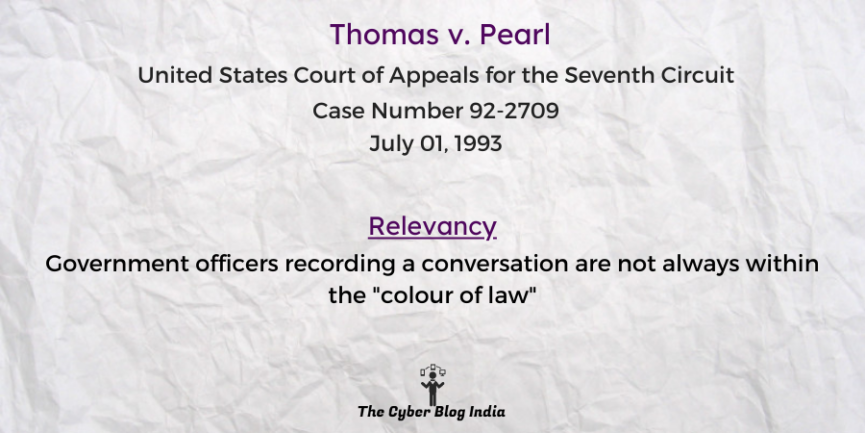Thomas v. Pearl

Thomas v. Pearl
998 F.2d 447, 451
In the United States Court of Appeals for the Seventh Circuit
Case Number 92-2709
Before Circuit Judge Cummings, Circuit Judge Cudahy and Circuit Judge Rovner
Decided on July 01, 1993
Relevancy of the case: Government officers recording a conversation are not always within the “colour of law”
Statutes and Provisions Involved
- The Restatement (Second) of Torts, 1977 § 581(a)
- The Federal Wiretapping Act, 18 USC §§ 2510-2520
Relevant Facts of the Case
- In 1988, the defendant began recruiting the plaintiff, a high school basketball player, to the University of Iowa.
- Meanwhile, an assistant coach at the University of Illinois allegedly offered the plaintiff $80,000, a flat for his grandmother, and a Chevrolet in exchange for accepting their scholarship.
- Believing this offer violated NCAA rules, the defendant obtained a tape recorder from the NCAA compliance officer. He called the plaintiff, friends, and family at least ten times, discussing Illinois’ offer.
- The NCAA investigated and found other violations, like auto loans and free tickets, but dismissed the major claims of money and a car.
- Consequently, Illinois was banned from the 1991 tournament, had scholarships reduced, and faced recruitment restrictions. Coaches’ pay was also frozen.
- The plaintiff then sued the defendant, accusing him of illegally recording phone conversations with his friends and family.
Prominent Arguments by the Counsels
- The plaintiff’s counsel argued that the defendant broke the federal wiretapping legislation and claimed that he invaded his privacy and slandered him.
- The defendant’s counsel submitted that when the defendant recorded talks with the plaintiff, his friends and family, he acted “under colour of law” as an assistant basketball coach at a public university. The defendant receives a salary from the state’s treasury. As a result, the defendant’s actions as a state employee would have been legal. Furthermore, the plaintiff could not prove the defendant’s intention to sue him for a tort.
Opinion of the Bench
- No matter the mitigating circumstances, society does not expect basketball coaches to wiretap their discussions with high school recruits.
- The plaintiff must demonstrate that the defendant’s actions cast a misleading light on him, that the publicity around him would be very upsetting to a reasonable person, and that the defendant either acted knowing the claims to be false or with reckless disregard for the truth. The plaintiff hasn’t demonstrated—or even hinted at—how the defendant’s actions cast him in a negative light.
Final Decision
- The court affirmed the District Court’s decision that the plaintiff failed to state a claim under federal or Illinois wiretapping laws.
